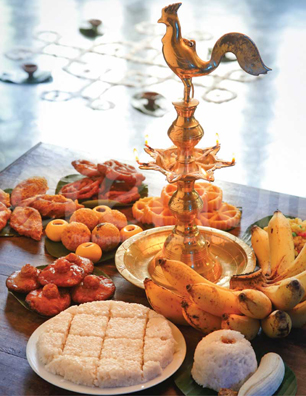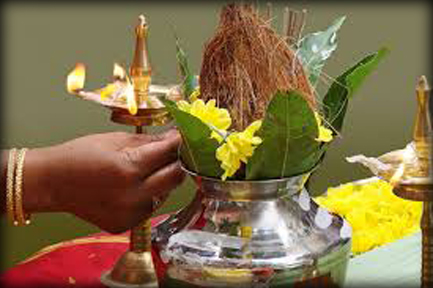|
Aluth Avurudda and Puthu Varusham :
Celebrating
affinity and kinship
By Anton Jesuthasan (Sajj)
 The Sinhala ‘Aluth Avurudda’ and the Tamil ‘Puthu Varusham’, the New
Year of Sri Lanka’s two major communities, will soon be upon us,
assuredly presenting together, reminding both communities of our
affinity and kinship, and demonstrating in countless ways our shared and
common heritage. The Sinhala ‘Aluth Avurudda’ and the Tamil ‘Puthu Varusham’, the New
Year of Sri Lanka’s two major communities, will soon be upon us,
assuredly presenting together, reminding both communities of our
affinity and kinship, and demonstrating in countless ways our shared and
common heritage.
‘Aluth Avurudda’ and ‘Puthu Varusham’ occur at the same time as the
New Years of many other South and Southeast Asian countries, such as
Thailand, Myanmar, Cambodia and Laos, and of course the State of Tamil
Nadu in India, where it is indeed the same ‘Puthu Varusham’ or ‘Puthandu’,
with not a lot to distinguish than between celebrations in Jaffna and
Batticaloa for instance. India celebrates various other New Year’s days
too in its other States.
Some New Years occur on varying days, as for example the Chinese New
Year, which falls on dates ranging almost a month, between January 21
and February 20, or the Islamic New Year, which that falls on dates that
ranger over months. Our New Year is constantly mid April, the 14th or
sometimes the 13th.
The Sinhala and the Tamil New Years are also referred to as the
Buddhist and Hindu New Years. Religious observances figure predominantly
in the celebrations, arising from our cultures where religion is an
integral part of our daily lives.
Sri Lankan communities, wherever in the world, celebrate their New
Year with as much enthusiasm and festive cheer as their compatriots at
home in Sri Lanka, except that any public display of the celebrations is
somewhat muted.
Celebrants and Participants
While the celebrants of the New Year are largely Sinhalese Buddhists
and Tamil Hindus, the participants are the entire nation: Sinhalese,
Tamils, Muslims, Burghers, just like with Christmas and the Roman New
Year, where people of all faiths and no faith participate. This religio-cultural
event, has, so much so, come to be regarded as the National New Year.
The New Year is largely celebrated as a family-and-friends affair,
but public celebratory events also take place, usually a few days later,
giving communities an opportunity for joint participation.
New Year is basically a harvest festival in origin, when in ancient
times our communities, which were largely agricultural, gathered in a
mood of achievement and jollity to share with families and friends the
successes of the crop growing season, and as a thanksgiving to the
Almighty for the blessings received over the passing year.
Like most New Year traditions, our traditions too are ancient, and
date back to the era long before the birth of Christ.
Spiritual Predominance
The traditional New Year practices common amongst both Sinhala and
Tamil communities usually begin with the ritual cleaning of the house
and its surrounds, settling of debts and other financial obligations,
readying of new clothes for everyone in the family, gathering and
preparation of special foods and visit to places of worship. All these
activities contribute to the creation of an atmosphere conducive to the
experiencing and practicing of life’s greater values such as
spirituality, neighbourliness, tolerance, respect for elders, concern
for the young, and love and concern for fellow beings.
 While
they stand out as an occasion for largely uninhibited, open-house,
socialising and for the display of conviviality and generous hospitality
towards one and all of whatever station in life, the Sinhala, Tamil New
Year is accepted more as a Buddhist, Hindu New Year, with the religious,
spiritual element predominating the day. While
they stand out as an occasion for largely uninhibited, open-house,
socialising and for the display of conviviality and generous hospitality
towards one and all of whatever station in life, the Sinhala, Tamil New
Year is accepted more as a Buddhist, Hindu New Year, with the religious,
spiritual element predominating the day.
Strengthening family relationships by way of sitting down to a
communal meal on New Year’s Day, settling of debts between not just
friends and family, but also with outsiders and starting the New Year on
a clean slate, are all regarded as an auspicious beginning to the New
Year.
As with the Western (Roman) New Year, which however has greater
visibility and familiarity, because perhaps of its greater universality,
and is celebrated by everyone regardless of culture or creed, Sri
Lanka’s cultural New Year , though less conspicuous in its arrival and
creep on us almost imperceptibly, without much fanfare from the media,
is still a serious occasion when the great virtues of reflection,
resolution, recrimination and reconciliation dominate us, as do a spirit
of hope, goodwill, and diffusive love that lead to good cheer and
revelry.
Reflections
Let me briefly reflect on some of the successes and achievements in
areas that do not catch the average person’s eye too readily, so as to
create a feeling of positivity for the occasion:
-We are able to justifiably claim that in the past year the country
has received greater acceptance from other more influential nations of
the world, as a respected fellow member of the community of nations.
-The country has made its 19th Amendment to its Constitution, taking
a further step in the right direction as a democratic State.
-We are seen as having faired satisfactorily at the national level in
meeting the Millennium Development Goals such as eradicating extreme
poverty and hunger, reducing child mortality, improving maternal health
and some of the other goals set for Sri Lanka, before the target date of
December 2015, although we still have a fair way to go in many of these
areas at the regional level.
Hope
One important area where more progress is required is reported to be
gender equality.
Since the end of the devastating war, Sri Lanka is said to have
graduated from lower to middle income status, though this again is not
palpable at every social and economic level in the country.
Writing at New Year some ten years ago, I was referring to people’s
strong hope for a just and lasting peace to become rooted in the
country. That hope still remains largely a hope, ten years on!
“Hope springs eternal in the human breast;
Man never is, but always to be blest:”
- Alexander Pope, An Essay on Man
Can we not just hope but could we believe that we are now well on the
way to a lasting peace? But much more than mere peace remains to be
achieved.
The departing year started with really high hopes for a new and
harmonious chapter in our relationships between communities. These hopes
are yet to be fulfilled, and remain high amongst the hopes for the New
Year. But this time they seem like a little more than hope; there seems
to be a belief that these hopes will see fulfilment soon.
Even Britain’s Channel 4 News, long a severe critic of Sri Lanka,
recently had a broadcast with a whisper of belief.
Walk tall, Head high
If we realise that it is in the interest of every individual, be he
the Head of State or a mere cog in the machine, to ensure peace in the
country, that the prosperity of our neighbour does not impinge on our
prosperity, on the contrary that it only enhances our own prosperity, if
we would work to instil this realisation and understanding in everyone
around us who fail to see this reality, and at New Year if we resolve in
our minds to toil to achieve, and if we do succeed in achieving this
result, if we can come to love our neighbour as we love ourselves, we
can walk tall, keep our heads high, and the world will regard us as men
and women of honour.
We need to make greater progress in winning the hearts and minds of
people towards peace and reconciliation, to not let the concept become
hackneyed or banal.
Love, the over-arching element
Finally, a brief look at ‘New Year: A Dialogue’, a poem from that
inspirational American author and poet Ella Wheeler Wilcox, the creator
of this memorable line in another of her poems –
SOLITUDE: “Laugh and the world laughs with you, weep, and you weep
alone,” words well worth remembering throughout the New Year, indeed
throughout life.
DIALOGUE - New Year arrives and knocks on our door, declaring itself
to be everything that we usually seek at New Year: Hope, Success, Good
Health, and Good Cheer, and something greater, something unusual that we
often do not realise: LOVE.
MORTAL - “The night is cold, the hour is late, the world is bleak and
drear,
Who is it knocking at my door?”
THE NEW YEAR - “I am Good Cheer.”
MORTAL - “Your voice is strange. I know you not; in shadows dark I
grope.
What seek you here?”
THE NEW YEAR - Friend let me in; my name is Hope.”.....
....... Success............Good Health.............
MORTAL - “Now, wide I fling my door. Come in, and your fair
statements prove.”
THE NEW YEAR - “But you must open too, your heart, for I am Love”.
Love is consummate: from “ a very strong emotional and sexual feeling
for someone”, “ to love for family and friends”, to “love that forgives
everything and asks for nothing” - in other words, unconditional love,
to “ love of God”, to “love for fellow beings: compassion, care,
concern, kindliness, fellow-feeling, humanity” - the love that Lord
Krishna, Buddha and Jesus Christ taught us, the love that the poet has
uppermost in her mind in the wake of the New Year, the love that will
bring fair and just peace between communities that we long for, peace
that will bring Prosperity to our nation.
Peace, Prosperity, Happiness, Good Luck and Good Cheer to all in the
New Year. |

